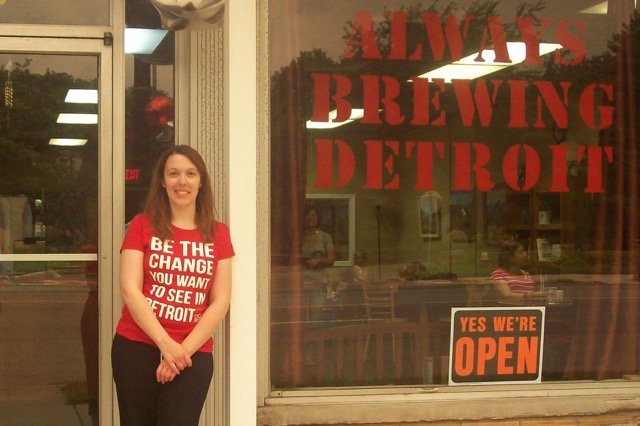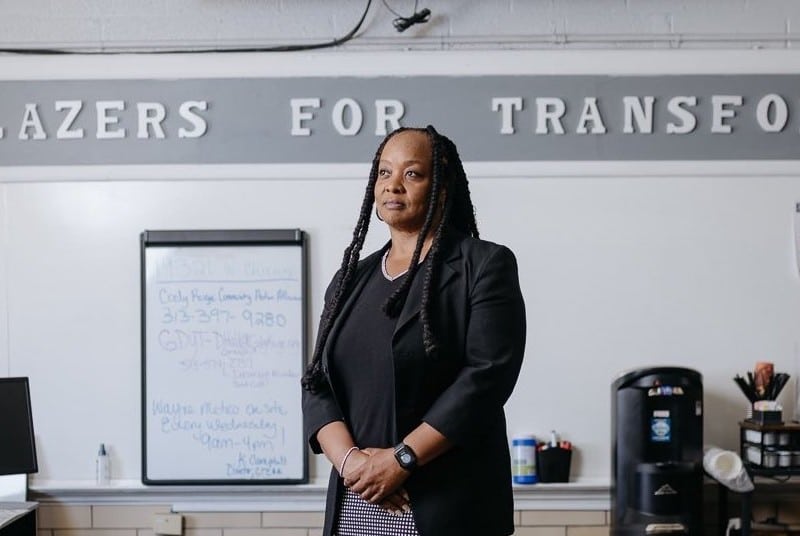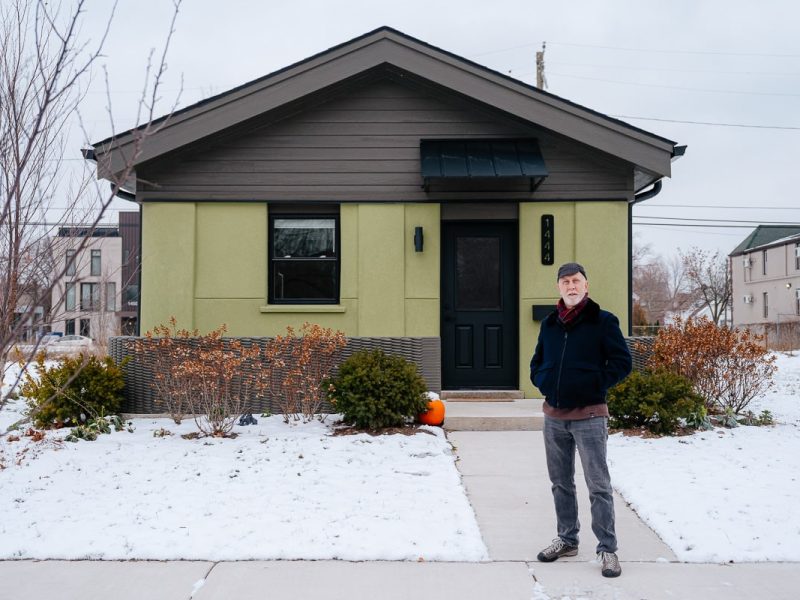Voices: Former owner of Always Brewing Detroit on letting go of her business
Amanda Brewington put everything she had into Always Brewing Detroit before selling it last year. In part two of our series on empowering failure, she writes about the experience of letting her business go.

Since I sold Always Brewing Detroit in November 2016, I’ve been asked to speak on panels and now write this post on overcoming failure. But the thing is, I don’t believe I’m a failure. Life is a process, a journey, an experience. I set out to create something. I did. And then I let it go.
Maybe it’s the time I spent studying Buddhism, but nothing is permanent—it’s not supposed to be. Life isn’t. When someone dies, I always look back on what they did. Was it a life full of great stories? I’m sad they’re gone for personal reasons—I’ll miss them. But I’m also really glad they lived at all.
Since I was a teenager, I knew I wanted to open a coffee shop. A place where myself and customers could feel comfortable. All I needed was the time and money.
But as I entered my mid-twenties I realized I was never going to have enough of either.
In September of 2011, I quit my job, moved downtown, and went back to waiting tables. While not a born and raised Detroiter, I spent tons of time here with my dad, a third generation Detroiter. He regularly took my little sister and I into the city, and it was always a positive experience—people were friendly, welcoming, and said hello to one another. I felt like I was finally in the right place at the right time.
“A community gathering space that also serves coffee,” would later be the tagline. Coffee shops are open to everyone with free wifi and items starting at a couple dollars. These places have low barriers to entry and can become community hubs. I wanted to create that space in Detroit.
Slowly the coffee shop came closer and closer to reality. I took a class on business plan writing. I found a mentor, Derrin Leppek, through TechTown Detroit. We worked on finalizing my business plan, finding a location, and securing funding.
I wanted to find a stable, strong community that could support my business, but also one that didn’t have a coffee shop. I spent months driving around the city looking at spaces, hoping they had a roof and functioning plumbing—not always the case. I was getting discouraged looking at spaces that needed too much rehab, applying for space and not getting selected. I was starting to think maybe this wasn’t going to happen.
On a dreary October morning I met with Tom Goddeeris of Grandmont Rosedale Development Corporation. He told me about this amazing neighborhood in Northwest Detroit: Grandmont Rosedale. People here really worked together to preserve their neighborhood, with block clubs, a safety taskforce, a farmers market, and multiple youth sports. This felt like a place I wanted to join. I met with the community and asked for their input and support.
With an engaged community and a dad that can build anything, I launched a 28-day pop-up to test the idea. With three red electric kettles and a wooden pour-over station my dad built, I opened the Monday after Thanksgiving in 2012. The community came out to support. They purchased coffee, loaned furniture, brought friends, organized events. They embraced me from day one.
After 28 days of sleep deprivation and 14 fewer pounds, I ended the pop-up. In January I met with my mentor to discuss the data I collected and figure out my next steps. During the pop-up, daily sales averaged under $100. After all the expenses to open, I had lost $900.
But it was a test. People came out and numbers had increased over the month. With an outdoor sign, functioning wifi, and an espresso machine, this might just work. I asked my mentor what he thought. He said, “It could really go either way.”
I was upset. I had worked really hard to prove this concept with inconclusive results? This was the first time I realized being in charge has its drawbacks. The choice to proceed was mine, and mine alone.
I participated in Detroit Soup, a pitch competition, and again the neighborhood came out to support. That night, in front of an audience of over 300, I won $1,889 to put toward an espresso machine. This was really happening. That night, I knew I had to move forward. While this was a solo endeavor on paper, my family, friends, and the community of Grandmont Rosedale were behind me.
I took out $20,000 in loans. From February to June of 2013, I waited tables all day and night to fund unexpected expenses like ceiling tiles, while my dad and then-boyfriend built the coffee shop.
The shop opened in July. It was amazing to see a dream realized. While open, the shop hosted baby showers, a wedding reception, and even a wake. The shop hosted other small businesses and events, from craft nights to community meetings to open mics to yoga classes. The plan was to be a space for all. And it was.
The shop was just breaking even. Numbers were improving, but at this rate it was going to be years before I could possibly consider living solely off the coffee shop or hiring an employee.
I thought maybe expanding to add a kitchen would be the solution. I imagined the shop would serve breakfast and lunch, host a monthly dinner club, and rent the kitchen during off hours to other food entrepreneurs. With more revenue streams this would surely be the way to make the shop work better, faster.
I applied for Motor City Match twice without success. Finally, in April 2016, I was awarded $45,000 from Motor City Match contingent upon finding $45,000 more to match it. Customers offered to loan me money directly to make it happen. I started having meetings with kitchen consultants and contractors. I wanted to make sure this would work, especially when people I cared about had money involved.
Just when it seemed I had a solid plan, I started to feel sick. I was sick for weeks. I went to several doctors. No one could figure out what was wrong. Then I started talking about my lifestyle, working over 70 hours a week for the past four years. It was stress and exhaustion. Nothing would help except rest—which I didn’t have time for.
Something we don’t talk about enough as business owners is the impact it has on your personal life. The shop was my life, my identity. While owning the shop I got engaged and then I became single. For one year I ran the shop without a partner in my personal life. The shop was not the reason for the split, but it definitely didn’t help an already stressed situation. The shift from being in a relationship with someone who supported me financially, to paying all my own personal bills and still subsidizing the shop by waiting tables is not something I’d recommend.
Finally in August 2016, I decided I had to sell or close the shop. I talked it through with my dad and committed to the decision. The very next day, I started to feel better. As soon as I made the decision in my mind—my body started to forgive me.
In September, I posted a note to the door of the shop explaining the reasons I had to close the shop: my personal situation had changed, the shop wasn’t making money fast enough to sustain me, and my poor health.
Everyone offered ideas of how we could save it. I appreciated that. As much as I valued their support, at the end of the day, the choice was mine, and mine alone—same as my decision to open it. I announced in a letter I was open to selling the shop, but if no one came along, I would close on November 1.
A friend of a friend made a concrete offer and seemed well intentioned to keep the shop similar to my vision of a community space. That was what mattered to me. We reached an agreement and the shop was officially sold on November 11, 2016. I shook hands with the new owner in front of the store.
I don’t know if I fully understood the word bittersweet until that moment. I was happy for the neighborhood that still had a coffee shop. I walked away with money to start a new chapter. But I had given away a part of myself that didn’t have a monetary value.
I remember how amazing it is that the shop happened at all. It was the hardest decision I’ve ever made. I miss my shop and the people in it everyday. But I set out to create something. I did. And then I let it go.
Always Brewing Detroit is one of my great stories.
This article is part of a series where entrepreneurs tell their stories of failure. It is sponsored by TechTown Detroit. Read more articles in the series here.
Got your own failure story? Email it to us in 150 words or less and you may be featured in a future article.
Amanda Brewington is the former owner of Always Brewing Detroit. She is currently a loan offer at ProsperUS Detroit.





